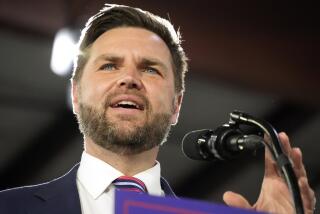Yale Professor a Moderating Voice in Debate Over Church and State : Government: Self-described liberal believes that religion should be included in political discussions.
- Share via
NEW HAVEN, Conn. — In the fractious world of religion and politics, where the soul of a nation is often portrayed as hanging on the thread of a single issue such as abortion or school prayer, a calm voice of compromise is emerging.
The herald of a mutually respectful approach to defining the boundaries of church and state is Yale Law School professor Stephen Carter, a soft-spoken, self-described liberal who rejects the notion that religion should be excluded from the body politic.
Why not, for example, allow safe-sex programs in schools, but give parents the right to excuse their children if it violates their religious principles?
And just as religiously based principles motivated the civil rights movement of the 1960s, so do individuals and groups today who oppose abortion on moral and spiritual grounds have the right to make their voices heard in political debates, Carter said.
“It is impossible for a private individual to violate the separation of church and state,” he said at a recent Yale forum on “Law and Religion: Values in Contemporary America.”
“The danger the separation of church and state guards against is not religion,” he said. “It is the state.”
Carter recently entered the literary and political limelight with a provocative book titled “The Culture of Disbelief: How American Law and Politics Trivialize Religious Devotion.” In it, he argues that the 1st Amendment was intended to prevent government interference in religion and safeguard religious freedom, and that it has been twisted in recent years in attempts to exclude religion from any role in public affairs.
Among the book’s many interested readers has been President Clinton, who recommended it at a recent meeting with religious leaders.
“The people of faith in this country ought to be able to say that religion shapes their approach to public debate without someone saying, ‘Oh, you’re just a right-winger,’ ” the President said.
Just how necessary a common ground may be in the contentious debate was dramatically illustrated at the forum held recently at Battell Chapel as part of the Yale Law School alumni weekend.
Sen. John Danforth (R-Mo.), the forum moderator, introduced the discussion by disputing the idea that the state cannot legislate morality because that is what lawmakers do in legislation from criminal law to health care reform.
When political foes say morality cannot be legislated, Danforth said, what they may mean is “you can’t do it while I’m busy doing it.”
During the ensuing debate among Yale Law School alumni, religious broadcaster Pat Robertson argued that proper legal concerns over the propriety of sectarian school prayers has steadily evolved into hostility toward religion.
He said his American Center for Law and Justice gets 30 complaints a week from people who say their rights have been infringed.
Among them, he said, were the cases of a 6-year-old girl told to sit down and put her head on the desk for giving a religious answer in response to a teacher’s question about the meaning of Christmas. In another case, Robertson said, a young man who brought a Bible to read in school during free time was told by a teacher to “get this thing out of here.”
Relating official hostility toward religion to the nation’s high rates of abortion, divorce and illiteracy, Robertson said: “Our nation is at risk. It is at risk because we have a naked public square.”
But Yale Law School professor Bruce Ackerman said a naked public square--one where religious convictions are left out of public policy debates--is a good thing.
If political action based on religious motivations is legitimized, he said, civic culture probably will degenerate and the nation will be driven apart by forces that have the potential to turn ugly because of their emotional power.
Although Ackerman evoked images of Iraqi leader Saddam Hussein and Robertson cited the Holocaust to buttress their views, Carter drew sustained applause in his appeal for an understanding based on mutual respect.
Respect means recognizing the legitimate concerns of those who fear that an individual religious group will dictate public policy, but also recognizing the right of religious individuals to participate in public policy debates, he said.
Citing the civil rights movement, Carter argued that religious rhetoric--in its best sense and in its best causes--can enable the nation to see moral truths.
Although sometimes it may contribute to tension, he said, religion can also “bring out the very best in America and the American people.”
More to Read
Sign up for our Book Club newsletter
Get the latest news, events and more from the Los Angeles Times Book Club, and help us get L.A. reading and talking.
You may occasionally receive promotional content from the Los Angeles Times.







